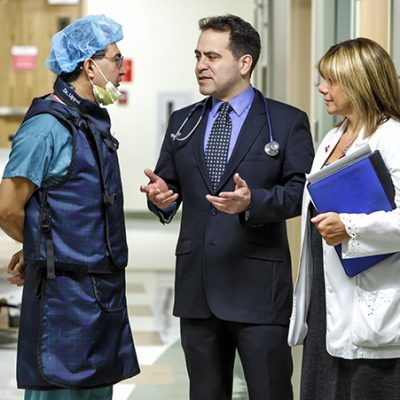
bayshore Community Hospital’s cardiovascular program boasts the latest technology… and impressive results
by Jessica Jones-Gorman • Photos By Amessé Photography
Over the past three years, Bayshore Community Hospital, part of Meridian CardioVascular Network, has built the breadth, depth, and capabilities of its cardiovascular program by earning designation as an accredited chest pain center and becoming qualified to provide primary angioplasty procedures for patients experiencing heart attacks. But it’s the hospital’s impressive “door-to-balloon” time (which measures the moments between patient admission and artery clearance) that makes the head of Bayshore’s cardiology department most proud.
“As a Primary Percutaneous Coronary Intervention (PCI) hospital, our goal is to open up the artery and establish blood flow back to the heart as quickly as we possibly can,” noted Dr. Shaddy Younan, director of Bayshore’s Catheterization Laboratory and the hospital’s chief of cardiology. “Traditionally, a patient with heart attack symptoms would be evaluated in the ER before waiting to be seen by a cardiologist, then taken over to the Catheterization Lab—which took a lot of time, often resulting in a loss of 30 to 40 minutes. But we started a new process where the cardiology department works together with the EMS system and ER staff to decrease waiting time and assess the patient’s situation in a more timely fashion.”
The streamlined process allows EMS technicians to call the Emergency Room from the ambulance and digitally send a patient’s history and EKG results. The ER then contacts cardiology, which readies for the procedure before the patient even arrives on site.
“Satisfactory door-to-balloon metrics for this country as dictated by the American Heart Association is 90 minutes,” Dr. Younan said. “But our maximum standard is 60 minutes and our goal is 45 to 50, which we accomplished in our first year. In some cases, we’ve even had door-to-balloon times as low as 15 mintues.”
According to Younan, Bayshore’s timing was the best in the hospital system, possibly the best in the state.
“There are not a lot of other programs doing this,” the cardiologist said. “When we launched, there were only a few places in the entire country doing it, and our outcomes have been tremendous. It’s a process that is better for the patient; it saves the heart muscle quicker and with less complications. Patients return to their active lives much quicker, with less limitations and with less of a hospital stay.”
And it’s just one of the innovative cardiovascular advances that Bayshore has initiated. In December of 2014, the hospital debuted a Multi-specialty Interventional Suite—with state-ofthe-art technology—so physicians can perform complex minimally invasive cardiovascular procedures, endovascular procedures, and interventional radiology procedures right within their patients’ community hospital—a huge benefit for local residents, who now no longer need to travel for such care.
“This new technology offers patients advanced diagnostic and therapeutic options in a comfortable setting,” Younan said. “The increased detail and clarity of these new imaging modalities allows physicians visibility and insight that was not available before. And because rooms are better designed and more spacious, surgeons can function more easily and there are no limitations with anesthesia or other factors during a procedure.”
For Dr. Younan, who comes from a well respected family of cardiologists, it’s the type of advancement that helps his specialty thrive.
“I was exposed to the field of medicine at an early age because of my father,” he recalled, detailing the career of Dr. George Younan, an esteemed cardiologist in the Meridian system who has served in various leadership roles and is the immediate past president of the medical staff at Bayshore. “I can remember going into different departments in the hospital with him, I had to be about three years old, and watching wideeyed as he worked. That was my initial introduction and from that point forward, I was intrigued by healthcare.”
While still in high school, Shaddy Younan became involved in the First Aid Squad in Holmdel before attending Tufts University in Boston to earn his undergraduate degree. He attended medical school at the former University of Medicine and Dentistry of New Jersey, before completing his internship and residency at Temple University Hospital. His brother, Dr. Zyad Younan, an electro physiologist, is also on staff at Bayshore. “I was always interested in the heart; in all of my prerequisite classes, whether it was biology, anatomy, or physiology, anything related to the heart always captured my interest.” And technological advances in the field of cardiology continue to peak Dr. Younan’s interests. “Every few years, something groundbreaking develops in this field, making our jobs easier and more interesting,” he added. “When I started, the big thing was carotid stenting, then radial artery cases became the norm. With every new advance there is less risk for the patient and quicker recovery times.” In the future, Dr. Younan explained that technology will only continue to advance the field. “There are biodegradable stents currently in trials here in the U.S., which I think will be the future of interventional cardiology,” he said. “They treat the blockage, take six months to two-and-a-half years to dissolve, and allow the artery to reconform to its original state.”
For Younan, it’s a next big step in the field that he has watched grow and advance. “With so many developing innovations, the field of cardiology is certainly growing and changing,” he concluded.
Bayshore Community Hospital
727 North Beers St., Holmdel / 732.739.5900
meridianhealth.com







